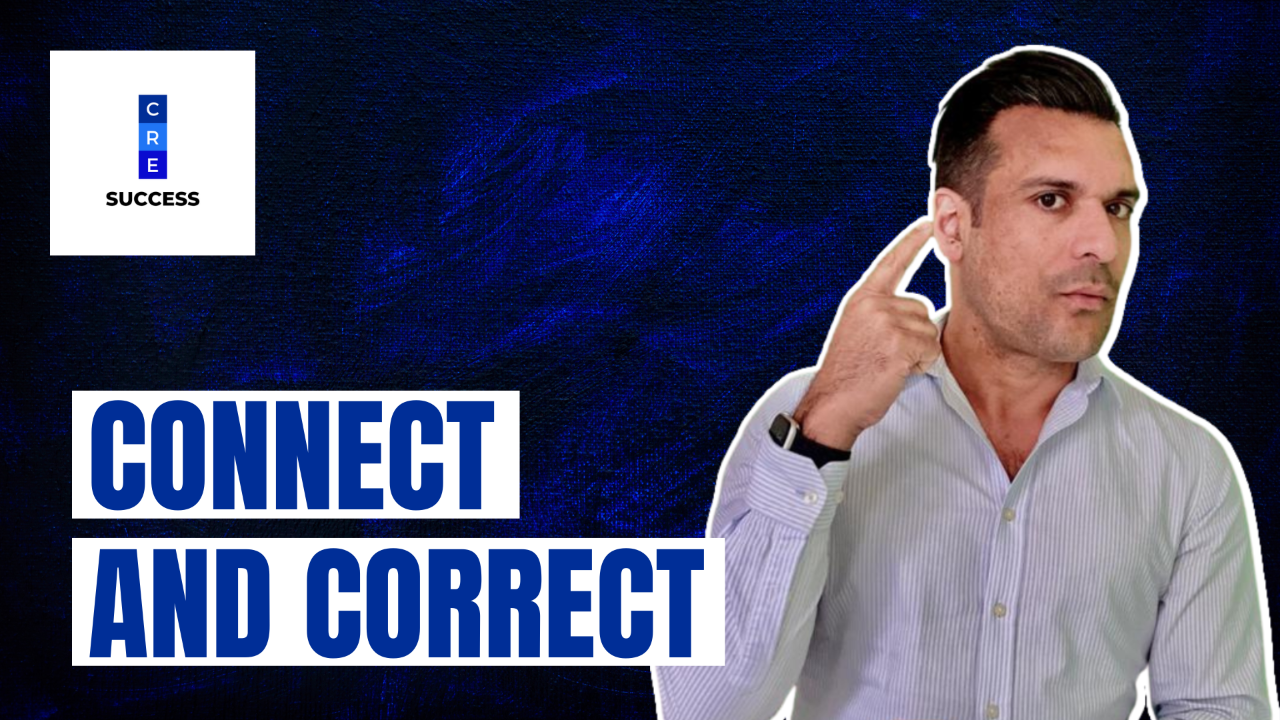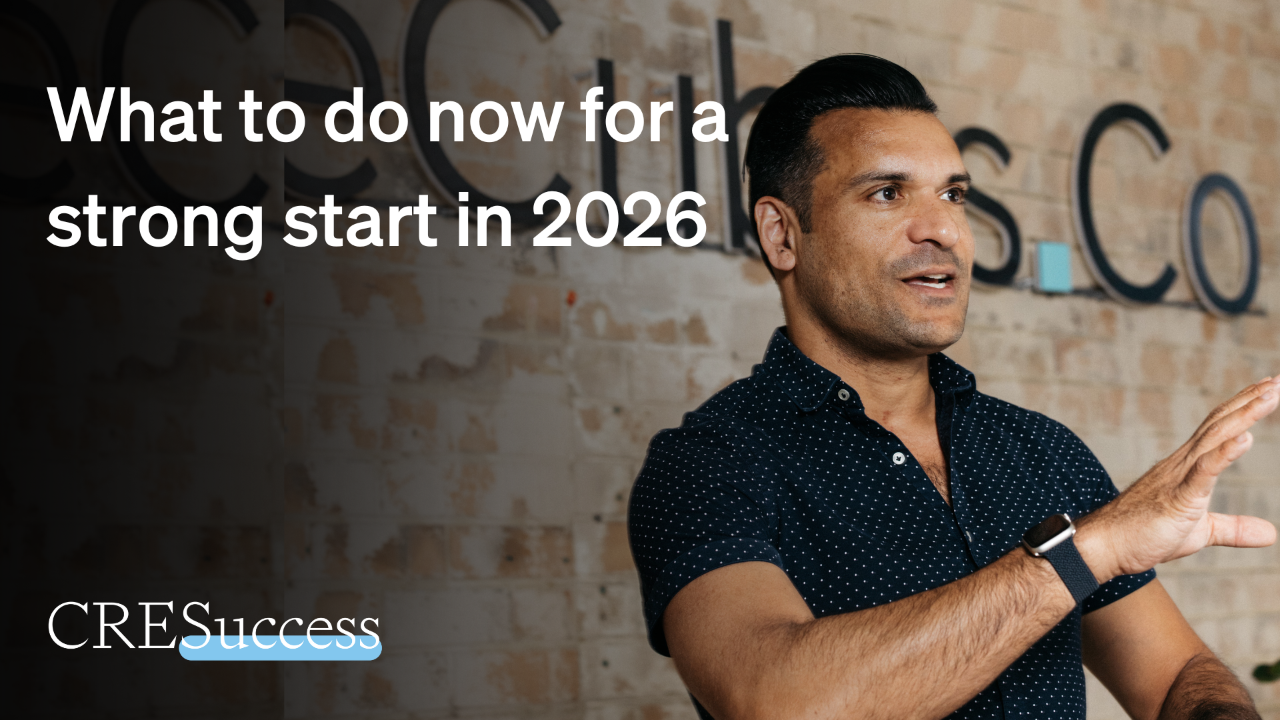Delivering effective feedback and growing as a commercial real estate leader
Nov 01, 2023
In this week’s blog, I want to share a simple concept that's changed the way I think about giving feedback.
It's called the "Connect and Correct" method, and it’s an idea I got from how a childcare educator interacts with my daughter.
The gist of it is simple: you make a genuine connection first, before addressing what needs to change – first Connect, then Correct.
This approach isn't just for 3-year-olds – it's also incredibly effective in a professional setting, and I think you might find it valuable too.
You can hear all about framing feedback, feedback frameworks and the importance of giving tailored feedback - so that you can guide others towards lasting improvement and set your business up for long-term growth - in episode 163 of Commercial Real Estate Leadership.
Episode transcript:
A common question that I get from the leaders that I work with is: How can I deliver this feedback to a member of my team?
What should I do to correct this behavior?
Well, in today's episode, we're going to be talking about exactly how you can be delivering feedback, so the person that you're delivering it to receives it, acts on it, and your relationship is preserved. Let's discuss.
Hello, welcome to episode 163, of Commercial Real Estate Leadership. I'm Darren Krakowiak, and I'm here to help commercial real estate leaders activate massive growth in their business.
And one way that you can do that apart from listening to this show is grabbing our free resource, which is called Multiplied Growth.
We'll show you how there are some small marginal improvements that you can make in your business that will deliver massive GCI grow for the commercial real estate agents in your team.
For more information on that go to cresuccess.co/growth
Grab that free resource. It comes with videos and spreadsheets that you can use to apply in your own business.
So, we're talking today about delivering feedback. And I want to preface this by saying that this is not about discipline. This is not about exiting people; this is just about coaching and helping people improve.
And I think when we look at it as helping people improve, coaching them supporting them, then it doesn't need to be a difficult conversation.
Or at least it's a much less difficult conversation than one which is delivering a written warning, or building towards exiting someone from your business.
And certainly, difficult conversations can be avoided by taking some action now, because it's easier to run a business that's with people who are not suboptimal because you've taken that action early, but also you can avoid some more difficult conversations in the future, because you've taken the action to help people improve.
So, let's talk about what makes these conversations easier for you.
Even if you think that they're difficult, what can we do to make difficult conversations or conversations about people's performance, or more about just things that they can do to be better, easier for you to have?
Well, the first thing I would say is that it's about the relationships that you have with your people.
So, if we have regular communication, if there is trust that is built, it's going to be much easier for us to deliver feedback.
And one of the best ways that I know, to build trust is through one-on-one meetings.
In terms of how we should be delivering the feedback, I think the tone should be constructive, but also respectful.
We want to make sure as well, that we're focusing on issues, I think which are relevant, and not petty.
So, this reminds me of a time that I had one client who told me that they didn't like a certain sort of speech pattern of one of their team members.
They found it irritating, and they asked me well, "How can I approach my team member about this particular speech pattern?"
Then what I said to them was, "It's maybe that's more about you than it is about them. Because if it's not impacting their ability to do work, if it's just something that you personally find a little bit irritating, then maybe you need to find a way of dealing with it."
Now, of course, if there's a way that they're communicating, which is actually to the detriment of their performance, which is negatively impacting others, then that can be something which you may want to address.
But make sure that when we're having these conversations, that we're not talking about things that are petty, which are personal, that is relevant to the context that we are in.
And when I'm talking about context, I think it's important to frame things in the right way.
So, I can recall when I was in a leadership role, and someone pulled me up on my behavior at an event, and the way that they framed it is, 'Darren, this doesn't reflect the leader that you are and the leader that you want to be.'
And that was a very, I think, irrelevant way to sort of say, "Hey, maybe other people can get away with this, but based on who we think you are, and where we think you're going, you can't get away with that."
So, think about what's important to that person, what their goals are and see if you can frame your feedback in that way.
Look, not many people like criticism. So, when we're delivering criticism, I think we need to deliver it in a way that recognizes that if we're going to be giving people feedback, which is perhaps not positive, then they make it their backup.
And they may not appreciate it. So, we have to be careful in terms of how we approach it.
And do it from a position of, I guess, empathy, right?
Be curious about what's going on with this person. Why are they acting that way? What do they need in order to improve?
Let's not make it confrontational. Let's try and I guess frame the conversation in terms that are relevant to them.
But also use some frameworks, which I'll give you now, which, you know, not dances around the issue.
We want to be direct; we do want to approach the issue. We want to make it clear what we're talking about. But we just want to present it in a way that's more likely for the other person to receive the information that we have to give.
And a couple of frameworks that I've come across, which I think are helpful.
One is, if you've ever done Toastmasters, you might have heard of the PIP framework, and they talk about it like a sandwich. It's Price Improvement Price.
And we when reviewing another Toastmaster who has given a speech, we start off with something good, then we go to something that they could improve, and then we finish off with something good as well.
So that is one framework you could use. Another one is connect and correct.
Let’s really, first of all, have some sort of connection with the person with the issue with what's going on with them, and then talk about what it is that we would like them to potentially improve.
And in fact, our childcare, teacher or educator, we're speaking to my wife and I about our daughter, and telling us about the way that she's been helping our daughters, I guess, social skills.
She's three years old, so still learning how to get along and not snatch and share and all that sort of stuff.
And one thing that she said to us was, "It's very important with Juna that we come down to her level, literally physically come down to her level and talk to her and explain to her. So we need to connect with her. And then we can try and correct the behavior."
And that also, I think is just related to making sure that the feedback that we're given is tailored to the individual.
Everyone has different personalities; everyone has different goals.
If we can just take a moment to think about how is the person that we're speaking to most likely to receive the information or be likely to receive it in a positive way, then that's going to go a long way to what we have to say being received in the manner in which it is intended.
The last thing I'd say on this topic is we're not just giving the advice and then leaving it there.
We want to make sure that people have some idea about what they can do next.
Now, I think it's always good to encourage or to see if somebody can make some commitment on their own about what they can do in terms of a plan of action to take on board the feedback that you've given.
But if they're not able to do that, then you might need to provide some advice to help them take some kind of corrective action.
And this is all about I think, talking about the future, talking about what is possible. And that I think is a way to leave things on a positive note.
Giving feedback, I know is not necessarily the easiest thing to do.
But I think if we think about the other person, we think about the way it's packaged, and we come at it in a way which is respectful, which is genuinely trying to help, then we'll be far more successful in communicating that feedback to people in our team.
Hey, I hope you're enjoying these episodes that we're preparing for you.
If you would like to send me any feedback, there's two ways that you can do it.
You can send an email to [email protected]
Or you can send me a DM on LinkedIn. You can find me on LinkedIn, my name in the show notes.
And yeah, let me know what you're enjoying about the show. Maybe if you've got any thoughts about some of the topics that we've been talking about in the past couple of weeks and what you'd like to hear us talk about in the future.
I would absolutely love to hear from you. But for now, thank you so much for listening, and I will speak to you soon.








